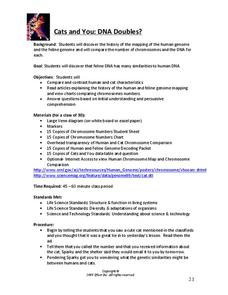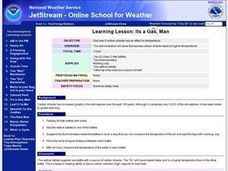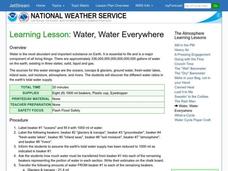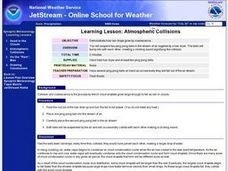Just Health Action
Environmental Justice Matters: Mapping Environmental Justice Impacts (Part 1)
A case study of Seattle, Washington permits class members to compare and rank how different areas of Seattle are impacted by environment burdens. Groups investigate different zip codes, collect data on five categories, and color-code a...
Curated OER
If Anyone Can, Icon
Students investigate the use of zip code/city searches to locate local weather forecasts. They design icons to be used on a classroom forecast poster.
Curated OER
Graphing Changes in Weather
Students graph current temperature and weather conditions for three days. In this weather lesson plan, students go to the Weather Channel's website and look up weather for their zip code then graph the conditions and record the...
Project WET Foundation
Explore Watersheds
What makes a watershed? What are the natural and human features of a watershed? How do human features affect watersheds? Where can I find my local watershed? These questions are thoroughly explained in an informative watershed interactive.
Beyond Benign
Cats and You: DNA Doubles?
What do cats and human DNA have in common? The second instructional activity of a series focuses on the mapping of mammal genomes. Scholars learn about the structure of DNA as they compare the chromosomes of humans and felines.
Curated OER
Electric Circuits
Fifth graders build a simple circuit which transmits Morse code using a battery, bulb, wire, switch, and tape. They analyze problems that arise while transmitting their messages to each other.
Curated OER
Understanding Weather and Climate Patterns
Students research the climate patterns of various locations and make predictions based on their findings. They determine the importance of latitude and longitude in weather and climate. Students create graphs displaying their collected...
Chicago Botanic Garden
Recent Weather Patterns
Decide whether weather is changing! A two-part activity first challenges classes to review the differences between weather and climate. Once finished, individuals then analyze historical data to determine if climate change is happening...
Curated OER
Jumpin' Pepper and Lazy Salt
Students examine the result of a negative charge. After rubbing a balloon with a wool cloth, students hold it over a mixture of salt and pepper. They observe the pepper "jumps" to the balloon. Students discuss their observations and then...
Curated OER
Death by Particles
Emerging epidemiologists define relative risk and read an article about the effect of particulate pollution on the cardiovascular health of women. They record the relative risk values, graph them, and answer analysis questions. This is a...
Curated OER
Biomes
Students collect information about different biomes, and locate the biomes on a world map. They read a climograph and match them to the appropriate biomes.
Curated OER
Create a Weather Newscast
Fourth graders explore and study basic weather terms, strengthen research skill on the web and create a weather newscast. They choose a weather site on the web, copy weather maps and create a videotape based on a written script to...
Curated OER
Apple Estimation: Percentages & Subjective Reasoning
Students practice using their estimation skills by utilizing apples. In this percentage lesson, students utilize a scale and an apple to discover the percentage of each bite they take. Students share their data with the rest...
Curated OER
Daily Weather Calendar
Third graders use the internet to record the daily weather conditions. Using symbols, they take the information they gathered and create an easy to read chart. They share their charts with the class to end the lesson.
Curated OER
Create an Astrolabe Instructions for Teachers
Students, who are teachers, make an astrolabe using the given pattern. They examine the uses of an astrolabe and apply the worksheets in their classrooms.
Curated OER
Space Science: Constellations and the Sun
Students review the zodiac signs and illustrate their movement using constellations on the wall and themselves to represent earth. Individually or in groups, they stand in the center of the room while a shadeless lamp is placed between...
Curated OER
Visit the Animals of the Arctic Scavenger Hunt
In this Arctic animals worksheet, students participate in an Internet scavenger hunt to answer five questions about various Arctic animals.
Curated OER
Weather Station
Students create their own barometer, precipitation, rain gauge, anemometer, and more with their weather stations. In this weather station lesson plan, students access on line websites on how to make their own weather tools.
Curated OER
Drifting Continents
In this plate tectonics worksheet, students study the continents map and complete 8 short answer questions related to them. They predict what the Earth will look like millions from now.
Curated OER
The Spanish Omelet
High schoolers use analogies to show the relationships among cell, nucleus, genes, chromosome, ribosome, replication, mitosis, transcription, translation, DNA, RNA, amino acids and proteins, genotype, phenotype, and genetics vs....
Curated OER
Learning Lesson: Its a Gas, Man
Students participate in a demonstration in which they examine the effect on temperature by carbon dioxide. They discuss the effects of carbon dioxide on the environment. They also examine summer safety rules to end the activity.
Curated OER
Water, Water Everywhere
Students estimate the amount of water that can be found in its various forms including oceans, lakes, glaciers, rivers, etc. They view a demonstration about water distribution and discuss flash flooding safety precautions.
Curated OER
Learning Lesson: Atmospheric Collisions
Students participate in a demonstration showing how rain drops grow by coalescence. They use ping pong balls and put them in an air stream. They end the lesson discussing flash flood safety.
Curated OER
Create a Compass Instructions for Teachers
Students, who are teachers, discover how to make box and water compass in their classrooms. They describe the scientific principles that are involved in making and using a compass.

























